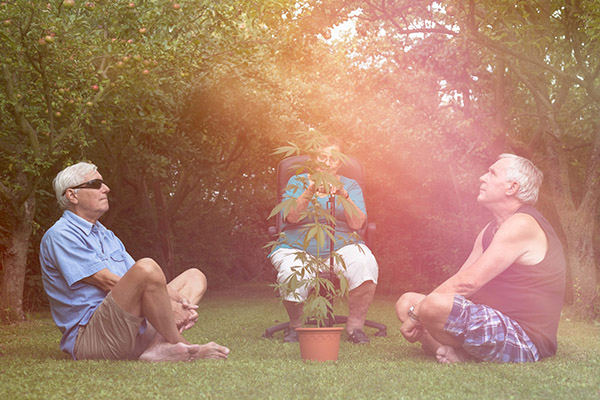Seniors Are The Fastest-Growing Demographic For Marijuana
Seniors Are The Fastest-Growing Demographic For Marijuana

People like to complain that baby boomers never change, but at least when it comes to marijuana, older people are ready to indulge (and get high). According to a federal survey, the number of Americans over 65 who use marijuana has nearly tripled in a decade, rising from 11 percent in 2009 to 32 percent in 2019. In addition, more than half of the population aged 60-64 reported using cannabis.
While other generations love to hate baby boomers for their regressive attitudes, in their defense, many of them did grow up in the 1960s and 1970s, an era of psychedelic music and free love. While it's easy for young people to think this generation agreed with the absurd (and unscientific) Reagan drug war era, our grandparents may have been more excited than expected about the recent legalization of marijuana that's underway. That, at least, is what recent survey data suggest.
While they were part of the culture that saw revolutionaries like Jimi Hendrix and Bob Marley, who created some of the most extraordinary cannabis-inspired art of the century, there's another reason older people are turning to marijuana: they have health problems. Many people over 60 struggle with insomnia, pain, anxiety, arthritis, cancer, etc.
"If it wasn't for marijuana, I wouldn't be doing a lot of things anymore," Daniel, 61, who lives and works on a farm in Wisconsin, told The Hill. "I wouldn't do it because it hurts too much."
Uthe said he smoked marijuana "recreationally, maybe once a month, but way more for pain control." As many users of marijuana know, the line between medical and recreational use is thinner than is often assumed. For example, if using marijuana to treat an anxiety disorder also brings a good buzz, then that's okay, and if you are using marijuana to get a little buzz, it's okay that it helps with your anxiety.
Although baby boomers are the fastest-growing demographic, they are still less likely to smoke cannabis regularly than other generations. According to 2021 statistics, about 5 percent of Americans over the age of 54 and 10 percent of Americans in the 60-64 age group have used marijuana in the past month, compared to 24 percent of adults 25 and younger. However, these statistics may not be entirely reliable. While it's important to remember that many older Americans aren't as regressive as the baby boomer memes portray them to be, some may still cling to the "just say no" stigma that Reagan-era politics inflicted on them. As a result, it's likely that more older adults are using marijuana but keeping quiet about it.
"Since 2009, we have seen a significant increase in cannabis use across all age groups, across all demographic groups, with older adults participating for the first time." William Kerr, a senior scientist at the nonprofit Alcohol Research Group, said, adding that some older adults "don't admit [to marijuana use] in surveys."
A 2023 Gallup poll recently found that half of Americans have tried marijuana. To put that in perspective, the same data collection found that 34 percent of adults had tried marijuana in 1999, and 4 percent had tried it in 1969. However, this data can also again reflect the increasing legalization and social acceptance of marijuana. It's likely that people used more marijuana in previous years but didn't feel comfortable admitting this to pollsters until recently.
But fear not, young people reading this. You're still ahead of the game. Federal data shows that more than two in five adults between the ages of 19 and 30 now use marijuana. Most such people likely live in states where it is legal, suggesting that federal legalization could indeed help remove the stigma of marijuana.
Even older people (about the same age as most of our presidential candidates) aren't too welcoming of legalizing marijuana, let alone actually consuming it. According to Pew Research Center data from Fall 2022, only 30 percent of Americans over the age of 75 support legalizing recreational marijuana. This reflects the views of a generation, the "silent generation," who were born between 1928 and 1945 when recreational marijuana was not yet mainstream in society. "This is really the silent generation and every generation before it," Kerr told The Hill. "They weren't exposed to it when they were younger, and they've had a negative view of it for years."
Compared with their predecessors, baby boomers are more chill and in touch than we would think. The same Pew Research Center survey showed that 53 percent of Americans in the 65-74 age group support adult marijuana use, a figure that mirrors the national average.
However, while this data about open-minded, marijuana-smoking baby boomers is exciting, keep in mind that this is due to social and legal changes. Just because the adults of the Reagan era were open-minded doesn't mean the war on drugs didn't have a negative impact. Marijuana use declined sharply during the Reagan era of the 1980s, when most baby boomers shied away from using the herb because it was illegal, harder to obtain, and users faced more severe consequences if caught than they would now. Sometimes, even though legalization has many hurdles to overcome, it's important to look back to see how far we've come.
